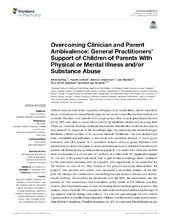| dc.contributor.author | Hafting, Marit | |
| dc.contributor.author | Gullbrå, Frøydis | |
| dc.contributor.author | Anderssen, Norman | |
| dc.contributor.author | Rørtveit, Guri | |
| dc.contributor.author | Smith-Sivertsen, Tone | |
| dc.contributor.author | Doesum, Karin van | |
| dc.date.accessioned | 2019-08-30T12:17:43Z | |
| dc.date.available | 2019-08-30T12:17:43Z | |
| dc.date.issued | 2019-01-08 | |
| dc.Published | Hafting M, Gullbrå F, Anderssen N, Rørtveit G, Smith-Sivertsen T, Doesum Kv. Overcoming clinician and parent ambivalence: General practitioners' support of children of parents with physical or mental illness and/or substance abuse. Frontiers in Psychiatry. 2019;9:724 | eng |
| dc.identifier.issn | 1664-0640 | |
| dc.identifier.uri | https://hdl.handle.net/1956/20753 | |
| dc.description.abstract | Children who are next of kin to parents with physical or mental illness and/or substance abuse need access to mental health support and several cost-effective interventions are available. Because most parents in the target group often consult general practitioners (GPs), GPs may have a crucial role in identifying burdened children and ensuring their follow-up. However, this important topic has received little attention in clinical discussions and research. In response to the knowledge gap, we conducted the research project Burdened Children as Next of Kin and the General Practitioner. Four sub-studies have been completed and published: a sub-study with qualitative analysis of focus group interviews with GPs (paper 1), a qualitative analysis of focus group interviews with adolescents as next of kin (paper 2), and a qualitative analysis of individual interviews with parents with illness and/or substance abuse (paper 3). The results from these sub-studies were incorporated in a survey sent to members of a nationwide GP organization (paper 4). The aim of the present sub-study was to gain further knowledge about conditions for the encounters between GPs and parents with impairments to be supportive for the children as next of kin. The material of the present sub-study derived from the project's four previous sub-studies and comprised a secondary analysis of the four prior sub-studies. We conducted an overarching thematic analysis of these sub-studies' results sections. We searched for statements from the GPs, the adolescents, and the parents on their experiences and evaluations of the needs of the children and their families, and the possible ways of accommodating these needs in general practice. The analysis shows that both GPs and parents were ambivalent about addressing the topic of the patients' children during consultations. This was the case although the GPs were in a good position to identify these vulnerable children, and the parents were worried about their children's situations. Possible strategies for GPs to overcome this ambivalence can be to (1) strengthen their competence in the topic, (2) gradually build trusting relationships with parents, and (3) gradually gain contextual knowledge about the families' situations. GPs can do this by performing ordinary GP tasks and acknowledging the parents' efforts to give their children good daily lives. | en_US |
| dc.language.iso | eng | eng |
| dc.publisher | Frontiers | eng |
| dc.rights | Attribution CC BY | eng |
| dc.rights.uri | http://creativecommons.org/licenses/by/4.0 | eng |
| dc.subject | children as next of kin | eng |
| dc.subject | parents with impairments | eng |
| dc.subject | general practitioners | eng |
| dc.subject | health prevention | eng |
| dc.subject | health promotion | eng |
| dc.subject | qualitative research | eng |
| dc.title | Overcoming clinician and parent ambivalence: General practitioners' support of children of parents with physical or mental illness and/or substance abuse | eng |
| dc.type | Peer reviewed | |
| dc.type | Journal article | |
| dc.date.updated | 2019-08-05T08:56:53Z | |
| dc.description.version | publishedVersion | |
| dc.rights.holder | Copyright 2019 The Author(s) | eng |
| dc.identifier.doi | https://doi.org/10.3389/fpsyt.2018.00724 | |
| dc.identifier.cristin | 1656584 | |
| dc.source.journal | Frontiers in Psychiatry | |

